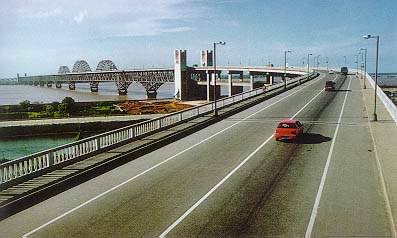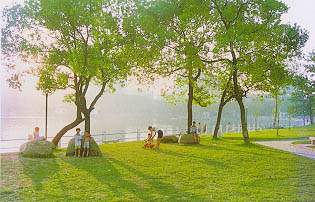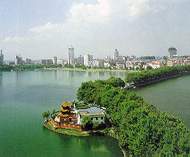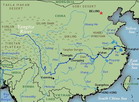2020 Yangtze River Cruise and Ferry Starting from 79 USD p.p.!
Jiujiang Introduction
Though the capital of Jiangxi Province
is Nanchang, Jiujiang, with a population of
355,000, is the main port for distributing products
from Poyang Lake and the surrounding counties
as well as much of the chinaware produced at
the porcelain capital of Jingdezhen. It has
the reputation of being the hottest port on the Yangtze,with
extremely oppressive summers. Though once an
important tea-buying centre in its own right,
it was gradually superseded by Wuhan, and tea
grow-n inJiangxi was shipped either upstream
to Wuhan or downstream to Shanghai. Today, cotton
textiles form Jiujiang's main industry.
of being the hottest port on the Yangtze,with
extremely oppressive summers. Though once an
important tea-buying centre in its own right,
it was gradually superseded by Wuhan, and tea
grow-n inJiangxi was shipped either upstream
to Wuhan or downstream to Shanghai. Today, cotton
textiles form Jiujiang's main industry.
Jiujian is the main access city to one
of China's most famous mountain beauty spots,
Lushan, lying only a short distance to the south,
which attracts 2.5 million tourists a year.
Jiujang no Ionger has an airport. The closest
airport is Nanchang.
HISTORY OF JIUJIANG
In ancient times, nine rivers were
said to have converged at this point, hence
the nameJiujiang--'Nine Rivers'--though it was
also called Jiangzhou and Xunyang. In its long
history it has seen many upheavals, in the last
century it was a Taiping stronghold from which
the rebels held out against the imperial Qing
armies for five years.
The area holds many memories for
lovers of Chinese poetry. Tao Yuanming(365-429)
lived at  the
foot of Lushan and was appointed magistrate
of nearby PengzeCounty. This post was so poorly
endowed that, rather than work 'for five pecks
of grain to break one's back', he resigned after
83 days, preferring to eke out a living as a
recluse in his home village. His essay Peach
Flower Garden depicts his idea of a perfect
society. Li Bai (70l--62), implicated in the
An Lushan Rebellion, was imprisoned briefly
in Jiujiang in 757. BaiJuyt (772--846) also
spent a period of official disgrace here as
a middle-ranking official and is affectionately
remembered. His poem The Lute Song tells of
his sadness at his isolation in this small town.
Su Dongpo was a frequent visitor to the area.
the
foot of Lushan and was appointed magistrate
of nearby PengzeCounty. This post was so poorly
endowed that, rather than work 'for five pecks
of grain to break one's back', he resigned after
83 days, preferring to eke out a living as a
recluse in his home village. His essay Peach
Flower Garden depicts his idea of a perfect
society. Li Bai (70l--62), implicated in the
An Lushan Rebellion, was imprisoned briefly
in Jiujiang in 757. BaiJuyt (772--846) also
spent a period of official disgrace here as
a middle-ranking official and is affectionately
remembered. His poem The Lute Song tells of
his sadness at his isolation in this small town.
Su Dongpo was a frequent visitor to the area.
When Jiujiang was thrown open as
a treaty port in 1862 it had suffered terribly
as a consequence of the Taiping Rebellion (1850--64).
A British member of Lord Elgin's mission noted
in 1858:
We found it to the last degree deplorable.
A single dilapidated street,
composed only of a few mean shops,
was all that existed of this once
thriving and populous city: the
remainder of the vast area, composed
within walls five or six miles in
circumference, contained nothing
but ruins, weeds, and kitchen gardens.

Jiujiang was once one of the three
centres of the tea trade in China, along with
Hankou and Fuzhou. There were two Russian factories
producing brick--tea, but these ceased to operate
after l917. The British concession in Jiujiang
was given up in 1927 after looting by mutineering
garrisons and mobs. Economic recession set in
by the 1880s with greater competition from tea
producers in India and Ceylon. With the military
advance downriver from Wuhanled by the Guomindang
in 1927, the remaining foreign community fled
on British and American warships to the safety
of Shanghai, never to return. Jiujiang was surrendered
officially by Britain in 1927.
• JiuJiang and its history
• What
to see in Jiujiang
• Lushan
• Stone
Bell Hill
• Dragon
Palace Cave & Poyang Lake



